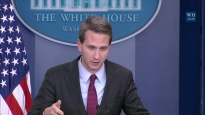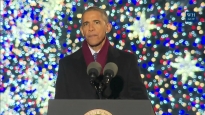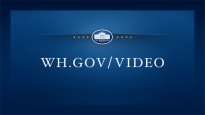President Obama Speaks at the Nuclear Security Summit
March 27, 2012 | 5:05 | Public Domain
President Obama’s remarks from the Opening Plenary Session of the Nuclear Security Summit in Seoul.
Remarks by President Obama at Opening Plenary Session of the Nuclear Security Summit
Coex Center
Seoul, Republic of Korea
9:22 A.M. KST
PRESIDENT OBAMA: Thank you very much, President Lee, for welcoming us here today and for the extraordinary hospitality and accommodations that have been provided by the Republic of Korea. We are very grateful to you, and we are grateful to the Korean people for the outstanding leadership in bringing us here together in Seoul.
Like the G20 summit two years ago, this gathering is a tribute to the nations that contribute to security and peace that's playing a leading role around the globe and that's taking its rightful place on the world stage. When I hosted the first Nuclear Security Summit two years ago in Washington, there were those who questioned whether our nations could summon the will to confront one of the gravest dangers of our time. In part because it involves a lot of technical issues, in part because the world was still grappling with a whole host of other issues like the economy and the global recession, there was some skepticism that we would be able to sustain an effort around this topic. But that's exactly what we've done.
We've agreed that nuclear terrorism is one of the most urgent and serious threats to global security. We agreed to the goal of securing the world's nuclear materials in four years. We committed ourselves to specific and concrete actions. And to get this done, we agreed a new effort of sustained and effective international cooperation was required, that we would need to create an architecture in which we could share best practices, help to enforce many of the commitments that we had already made, and continue to improve every aspect of this issue.
Over the past two years, the questions have been different
-- would we back up our words with deeds; would we sustain our cooperation. Today, here in Seoul, we can answer with a resounding yes. We are fulfilling the commitments we made in Washington. We are improving security at our nuclear facilities. We are forging new partnerships. We are removing nuclear materials, and in some cases, getting rid of these materials entirely. And as a result, more of the world's nuclear materials will never fall into the hands of terrorists who would gladly use them against us.
Of course, what's also undeniable is that the threat remains. There are still too many bad actors in search of these dangerous materials, and these dangerous materials are still vulnerable in too many places. It would not take much -- just a handful or so of these materials -- to kill hundreds of thousands of innocent people. And that's not an exaggeration; that's the reality that we face.
And that's why what's required continues to be a serious and sustained effort, and why I'm so encouraged by the excellent participation today, which is, again, a testimony to President Lee's leadership. More nations have come to the table -- this time, more than 50 -- not to talk, but to take action. As a consequence of this summit, more commitments will be made -- more real, tangible steps. As a consequence, more of our citizens will be safer from the danger of nuclear terrorism.
I think we all understand that no one nation can do this alone. This is one of those challenges in our interconnected world that can only be met when we work as an international community. And what we did in Washington, what we're now doing in Korea, becomes part of a larger global architecture designed to reduce the dangers of nuclear weapons and nuclear terrorism, but also allows us then to more safely and effectively pursue peaceful uses of nuclear energy.
So, again, I want to thank President Lee for his leadership. I want to thank all the leaders who are participating here today. I know people's schedules are extraordinarily busy. We've come a long way in a very short time, and that should encourage us. And that should not lead us to complacency, however; it should fortify our will as we continue to deal with these issues.
I believe we can maintain that will and that focus. I believe we must, because the security of the world depends on the actions that we take.
So, President Lee, thank you again.
END
9:27 A.M. KST
|
December 2, 2016
|
December 2, 2016
|
December 2, 2016
|
December 1, 2016
|
|
December 1, 2016
|
November 30, 2016
|
November 30, 2016
|
November 30, 2016
|
- &lsaquo previous
- …
- 4
- 5
- 6
- 7
- 8
- 9
- 10
- 11
- 12
- …
- next &rsaquo







